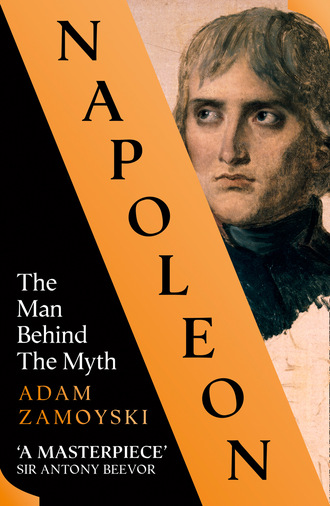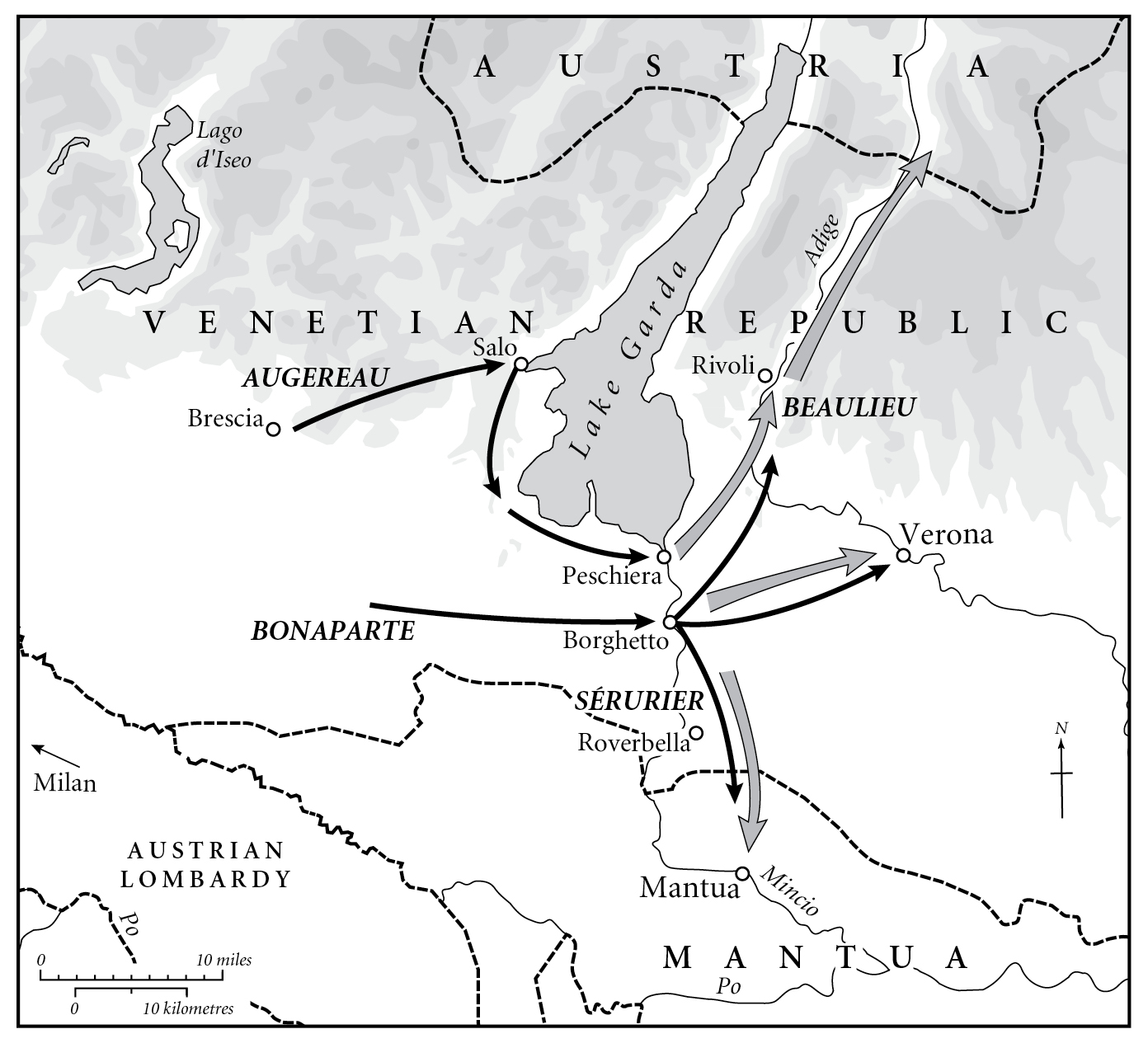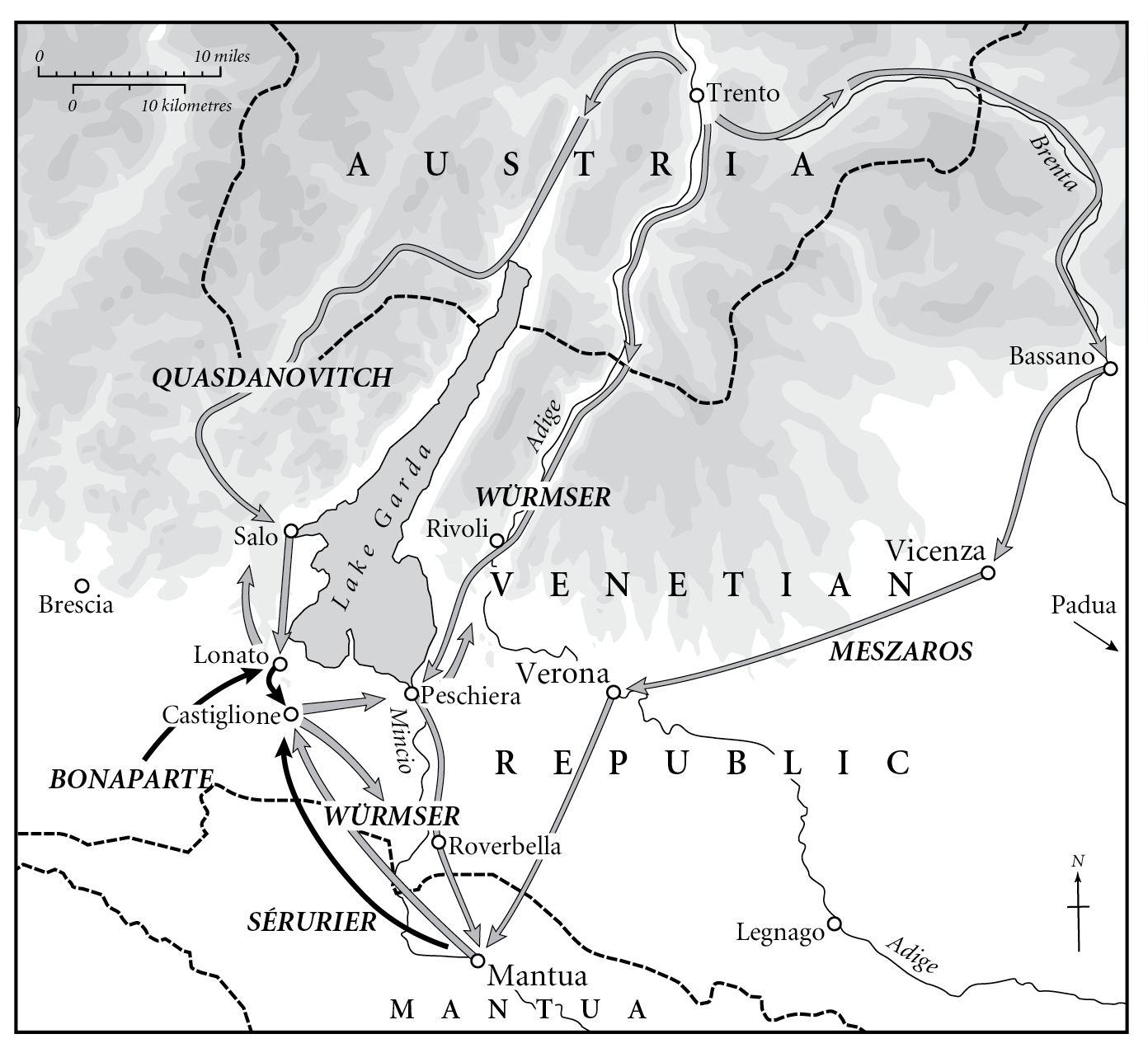
Полная версия
Napoleon
‘Of all the passions which affect the human heart, there is none which is more forceful than the love of la gloire,’ wrote Germaine de Staël in her book De l’influence des passions sur le bonheur des individus et des nations, published that very year of 1796. She did not belittle the part played in this by ambition or vanity, but saw the pursuit of gloire as a force in itself. ‘It is, without doubt, an intoxicating sensation to fill the universe with one’s name, to go so far beyond the bounds of one’s being that it becomes possible to delude oneself as to the limits and extent of one’s life, and to believe that one possesses some of the metaphysical attributes of infinity.’ She pointed out that in this psychological climate, anyone who could achieve gloire and offer to others the chance of a share in it would excite in them the spirit of emulation to such a degree that they would exert themselves to the very limit and beyond, creating a seemingly superhuman surge of energy.11
Brought up reading Plutarch’s lives of the heroes, Bonaparte and his peers yearned to emulate them. They were also profoundly affected by the Romantic sensibility expressed in the works of Rousseau, Goethe and Macpherson. The conflation of the urge to the heroic with that for emotional transcendence developed in many a subliminal belief that they were living a legend and conquering the impossible, like not just the heroes but also the gods of antiquity.
It was in the guise of a conquering hero that on 15 May Bonaparte made a triumphal entry into Milan, the capital of Lombardy, mounted on a white horse, preceded by a column of Austrian prisoners and followed at a respectful distance by his staff and then his troops. He passed under a Roman triumphal arch and another made of foliage and flowers, greeted with enthusiasm by Italian Jacobins and nationalists who had been awaiting him, in the words of one of them, ‘as the Israelites awaited the Messiah’, hailing him as their deliverer from Austrian rule and, they hoped, the godfather of an independent Italian state. Those less politically aroused also turned out in force to get a look at this man whose deeds were assuming legendary proportions in the public imagination. As it was a Sunday and the feast of the Pentecost they were dressed up, presenting a curious contrast with the conquerors of the mighty Austrian army.12
‘Our uniforms, worn out by long spells of mountain warfare, had been replaced by anything the soldiers could lay their hands on,’ recalled Sergeant Vigo-Roussillon. ‘In place of our long-rotted cartridge-cases we had belts made of goatskin in which we carried our cartridges. Our heads were covered with bonnets made of sheep, cat or rabbit fur. A fox-fur bonnet with the tail hanging down the back was a prized possession.’ They wore breeches or trousers of every colour, fancy, even embroidered waistcoats, and a variety of footwear.13
Two comrades-in-arms, a major and a lieutenant, shared three shirts, one pair of brown trousers, one uniform coat and one overcoat, which was worn by the one not wearing the trousers that day. One young officer brushed up as best he could when invited to dinner by the marchesa in whose residence he was billeted, but nevertheless padded into the dining room on bare feet.14
Bonaparte had gone straight to the archbishop’s residence, where he slept for a couple of hours and had a bath before attending a banquet in his honour. He then moved into the Serbelloni Palace, which had been placed at his disposal. He was also offered the beautiful prima donna of La Scala, Giuseppina Grassini, but could think only of Josephine, so Berthier stepped in. Bonaparte was not going to waste time in Milan.
On 20 May he issued a proclamation to his ‘brothers in arms’: ‘Soldiers! You rushed like a torrent from the heights of the Apennines, you defeated, dispersed, scattered all that opposed your progress. Delivered from Austrian tyranny, Piedmont gave in to its natural sentiments of peace and friendship with France. Milan is yours, and the republican standard flies over the whole of Lombardy. The dukes of Parma and Modena owe their continued political existence only thanks to your generosity. The army which threatened you with such arrogance can no longer find a bulwark strong enough to shield it from your courage.’ He could see they were already tired of inactivity, and burning to achieve greater glory: ‘Well, let us go forward!’ he continued. ‘We still have forced marches to make, enemies to subdue, laurels to pick, wrongs to avenge.’ While they must be ready to defend the Republic, they must also fly to the aid of sister nations: ‘You will have the immortal glory of changing the face of the most beautiful part of Europe. The French nation, free, respected throughout the world, will give Europe a glorious peace which will redeem all the sacrifices it has made over the past six years. You will then return to your homes, and your fellow-citizens will say as they point you out: “He was in the Army of Italy!”’15
More to the point, he decreed that whereas they had hitherto been paid in paper money, which few, particularly in foreign lands, would accept, henceforth they would receive half of their pay in specie. The move was probably dictated in part by the need to stem the looting, but it also created a new bond of gratitude and loyalty between him and his men. The Directory was appalled by this act of independence, which diverted some of the cash being sucked out of Italy, on which it was coming to depend, into the pockets of the troops. But there was nothing it could do. Bonaparte was the only one of the army commanders helping to finance it; he was winning battles and riding high in public opinion. He was beyond the Directors’ control, and whether they liked it or not, their fate was closely tied to his popularity. On 29 May a fête of thanksgiving and victory would be held in Paris at which the captured banners were paraded, a contingent of wounded were honoured with oak leaves, sprigs of laurel and palm fronds, symbolising valour, glory and martyrdom, and a ‘Song of Victory’, while Junot presented Josephine, now hailed as ‘Notre Dame des Victoires’, to garner acclaim for her husband and Carnot praised his ‘invincible phalanxes’, whose deeds would astonish future generations.16
On 17 May Bonaparte wrote to the Directors disingenuously asking for instructions on how to deal with the local patriots. He knew they were thinking of giving Lombardy either to the King of Sardinia, in order to secure his alliance, or to Austria as a bargaining chip in the forthcoming peace negotiations. But he had his own vision. ‘Nature drew the limits of France at the Alps, but it also drew those of the Empire at the Tyrol,’ he pointed out. He had already promised liberty to the people of Lombardy and sanctioned a national guard, whose colours were to be the tricolour of the French Republic with the blue replaced by green. He began reorganising the former Austrian province along French lines, aided by Italian patriots from various parts of the peninsula who saw this as the cornerstone of an independent Italy. He was by now consciously implementing his own ideas. ‘I’m doing what I want,’ he told a surprised Italian patriot.17
‘I believe in the French Republic, and in Bonaparte her son,’ ran a Credo composed by some Italian nationalists; but others cursed him. The depredations of the French, both by officials and by soldiers on the rampage, caused hardship to ordinary people, and all those opposed to the French intrusion, be they fearful upholders of the old regime or Catholics horrified at the godlessness of the invaders, gave vent to their grievances. Riots broke out in various places. Bonaparte reacted with energy and in some cases brutality, most notably at Binasco, where the locals had massacred French soldiers. ‘Having killed a hundred people, we burned down the village, a terrible but efficacious example,’ he wrote to Berthier afterwards. At Pavia, which had risen against the French, he let his troops loose on the town for a couple of hours. He admitted that ‘although necessary, this spectacle was none the less horrible, and I was painfully affected by it’. The measures did prove efficacious, and he was soon able to report that the province was quiet. He enrolled young men coming forward to serve in what they believed to be the cause of Italy into a Lombard armed force which could maintain order.18
The improved supply situation did not stop the looting; it merely refocused it, as officers and men began to think of enriching themselves rather than just helping themselves to what they needed. The example was set by Masséna, who exacted protection money from towns he passed through, and it was widely followed. Bonaparte turned a blind eye, and even encouraged his subordinates to enrich themselves while ostentatiously declining to accept bribes offered him by the authorities of cities such as Lucca and Modena in order to distinguish himself from other generals by his moral stance.19
At the same time, Saliceti was bleeding the country dry in the service of the French Republic, as well as his own. At Lodi he raided the cathedral treasury and the Monte de Pietà, the charity which served as pawnbroker, removing five cases of silver plate and a number of ingots, and requisitioned the city’s cash funds. In Milan he helped himself to the contents of the banks, the city chest and the Monte de Pietà, although this time he returned to poor debtors their paltry treasures. He repeated the pattern in every city. ‘You are creating a hundred times more currency with your bayonets than we can with all our imaginable financial laws,’ one of the Directors acknowledged.20
It was not only cash and disposable valuables that were taken. Seeing the French Republic as the second Rome, its rulers believed the greatest works of art and science, libraries and archives, mechanical and scientific instruments, and any collections that could serve progress should be brought together in Paris. A commission consisting of the mathematician Gaspard Monge, the chemist Claude Berthollet, the botanists André Thouin and La Billardière, as well as a number of artists, was on its way with orders to select the objects worthy of being included in the libraries and museums of the capital. (It is worth noting that a protest against this was signed by the painters David, Hubert Robert, Moreau le Jeune, Girodet, the architects Percier and Fontaine, and many others.21)
Bonaparte had never accepted the secondary role of staging a diversion in Italy while Moreau carried out the main operations in Germany, and was determined to reverse this by striking first. Assuming that Moreau must have crossed the Rhine, he was eager to press on. Beaulieu had fallen back behind the river Mincio, his right wing resting at Peschiera on the southern shore of Lake Garda and his left on Mantua. Moving briskly, Bonaparte pierced his line at Borghetto and then turned north to roll it up. Disorientated Austrian units raced north in order to avoid being cut off, but some were overtaken by the French advance. At Valeggio, where he had just sat down to a light lunch with Masséna and Murat, Bonaparte was surprised by an isolated enemy unit and only had time to pull on one boot before making a dash for safety over a wall. By dawn the following day he was pursuing the Austrians falling back on Peschiera and Verona, which he reached on 3 June. He was overwhelmed by the beauty of the city. ‘I have just seen the amphitheatre,’ he reported to the Directory. ‘These remains left by the people of Rome are truly worthy of it. I could not help feeling a sense of humiliation when I thought of the tawdriness of our Champ de Mars.’22
Beaulieu had made his escape northwards along the eastern side of Lake Garda, pursued by French cavalry, while part of his army took refuge in the fortress of Mantua, where it was bottled up by Sérurier. Bonaparte was now in control of the whole former Austrian province of Lombardy, and he set about securing it. Without consulting with the Directory, he signed an armistice with the kingdom of Naples, which thereby retired from the anti-French coalition, and received a Spanish diplomat sent by the Pope to negotiate peace with the Holy See.

He raced back to Milan expecting to find Josephine waiting for him. Instead he found instructions from the Directory ordering him to march on Rome, which he could not easily disobey. He set off, reaching Bologna on 19 June, where he was met by the Pope’s envoy offering a bribe of five million francs to ward off a French invasion. Bonaparte demanded forty million, as well as the treasure of the shrine of Loretto and a hundred works of art. On 23 June the Pope’s emissaries agreed, and signed an armistice. Bonaparte then crossed the Apennines and made for Livorno to secure the port against a possible landing by the British.
From there he made a trip to San Miniato to visit Canon Filippo Buonaparte, the last surviving member of the Tuscan branch of what might at one stage have been the same family as his own. He then marched on to Florence, where he went to the opera on the evening of 30 June and the following day lunched with the Grand Duke of Tuscany, brother of the Emperor Francis II with whom he was at war. By 4 July he was back at Roverbella, where he had established his headquarters.
He was worn out physically and mentally, and racked by anxiety alternating with jealousy over Josephine, whom he showered with increasingly despairing letters which reveal his changing moods. The brevity and lack of feeling of her infrequent letters inspired reproach and jealousy, followed by fears that she might be ill and self-reproach for having questioned her feelings. He pestered Joseph for news of her. On 18 May from Milan he wrote a letter full of joyful anticipation of what he thought was her imminent arrival, describing the beauties of Italy and the happy times ahead as they listened to divine music while watching her belly grow (he was still under the impression that she was pregnant). Five days later, worried by the lack of news from her, he wrote of how he had left a ball given for him at which he looked in vain among the many beauties for any who came close to her. ‘I could see only you, think only of you, and the thought made everything else unbearable, so, half an hour after arriving I went home to bed full of sadness.’ Thinking she would arrive on 13 June, he prepared her lodgings, but then discovered she had not left Paris yet. ‘I had opened my soul to joy, and it has filled with suffering,’ he wrote. He awaited the couriers with impatience, either to find that there was no letter from her, or if there was that it lacked the passion he craved. He concluded that her feelings for him had only been a ‘mild caprice’ which he had misunderstood, that while he had given himself to her entirely and lived only for her, she had merely toyed with him, and that she wanted a different kind of man. ‘Farewell, Josephine, stay in Paris, do not write to me any more, and at least respect my retreat,’ he wrote despairingly. ‘A thousand daggers are tearing my heart asunder, do not plunge them any deeper. Farewell, my happiness, my life, everything that existed for me on earth!!!’23
Having heard no more from her, three days later he wrote that there was nothing left for him but to die: ‘All the serpents of the furies are in my heart, and already I am half dead,’ he wrote, still faintly hoping she might be on her way. ‘I hate Paris, women and love …’ he protested. ‘Farewell, my Josephine, to think of you made me happy, but everything has changed entirely,’ he went on, saying that he would never stop loving her. He had spent the night rereading all her letters and wallowing in self-pity. The same day he wrote to Barras: ‘I am in despair as my wife won’t come, she has some lover holding her back in Paris, I curse all women but heartily embrace my good friends.’ Writing three days later from Tortona, he apologised to Josephine for expressing himself with such feeling, but explained that he had been ‘drowning in sorrow’. He had just received a letter from Murat informing him that she was unwell, and although he assured him that it was only a slight indisposition, Bonaparte flew into a panic that she might die. ‘If you die, I will also die, of despair, of devastation,’ he wrote, asking her to intercede with Barras to obtain leave for him to return to Paris. He no longer cared for glory or the service of the motherland, and could not think of victory while she was ill. This long letter was followed the next day by another, even longer and more tortured, in which he blamed himself for having accused her of inconstancy. ‘My life is a continuous nightmare,’ he complained. ‘I am suffocated by a deadly presentiment. I no longer live; I have lost more than life, more than Happiness, more than tranquillity; I am almost without hope.’ He longed to be able to come to Paris. ‘I am nothing without you,’ he went on. ‘I can hardly imagine how I existed before I knew you.’24
Josephine found his letters, and the teenage frenzy they expressed, ridiculous and embarrassing. She amused her friends by reading them out, and after sharing one particularly self-dramatising passage in which he referred to Othello, she exclaimed, ‘He is funny, Bonaparte!’ But, no doubt fed up with continual enquiries as to her health and afraid that Bonaparte might indeed turn up in Paris, where he was not wanted, Barras persuaded her to go. According to some accounts he bundled her into the carriage himself, along with her dog, her maid, Hippolyte Charles and Junot. She was followed by several men of business to whom she owed money, and to whom she promised to obtain lucrative contracts supplying the army.25
Their journey was a regal progress, every city along the way wishing to honour the wife of the national hero. At Lyon she went to a special performance of Gluck’s Iphigénie en Aulide. At Turin, where she found Marmont waiting to escort her on her onward journey, she was treated like visiting royalty by the king. Her entry into Milan on 13 July was triumphal. She was settled in the magnificent Serbelloni Palace with its pink marble columns, and showered with honours by the city authorities. Bonaparte was in such transports of joy to see her that, as she informed Thérèse Tallien, she thought he would go mad. He could not keep his hands off her, and seemed unaware of the presence of Hippolyte Charles, whose role almost everyone else had guessed.26
Two days after her arrival, on 15 July, Bonaparte had to rejoin his troops besieging Mantua, which was sheltering some 12,000 Austrians. Josephine remained in Milan, where she was bored, despite the receptions and entertainments laid on for her, particularly when Lieutenant Charles could no longer delay taking up his duties at the side of General Leclerc in Verona.
Bonaparte, who still suspected nothing, was in ecstasy. ‘What nights, my love, were those I spent in your arms!’ he wrote. ‘In my memory I ceaselessly relive everything we did, your kisses, your tears, your sweet jealousy, and the charms of the incomparable Josephine keep stoking an ardent and burning flame in my heart and in my senses. […] A few days ago I thought I loved you, but, since seeing you I feel that I love you a thousand times more.’27
That night he hoped to storm Mantua with a surprise attack from the lake, but the waters unexpectedly went down and the attempt failed. He was already planning another trick that might deliver him the fortress, but this did not prevent him from thinking of Josephine. The next evening he was walking by the lake by ‘silvery moonlight’ in the village outside Mantua where Virgil was born, ‘not one hour without thinking of my Josephine’. He was by now aware of the gossip about Lieutenant Charles, and had stumbled on evidence when he opened letters to Josephine from Barras and Thérèse Tallien. He playfully cursed her while professing his faith in her fidelity and her love for him. ‘Far from you, the nights are long, dull and sad, close to you one wishes it could always be night,’ he wrote, inviting her to join him at Brescia.28
She arrived on 26 July, meaning to go on to Verona to see Lieutenant Charles under the pretext of sightseeing, but soon after she set off she ran into enemy troops. Bonaparte sent Junot with a squadron of dragoons to escort her back; on the way they came under fire, and she had to leave her carriage and take cover in a ditch. He resolved to send her out of the war zone on a trip to Tuscany. At Parma she met Joseph Fesch, who was busily putting together an art collection by requisitioning anything that caught his eye. In Florence she was received by the grand duke. Bored by Florence, she went back to Brescia and, Bonaparte being absent, summoned Lieutenant Charles to share his quarters with her.
Bonaparte was desperate to take Mantua, whose garrison remained a threat, making vigorous sorties which prevented him from securing the area. Although he had concluded treaties with Naples, the papacy and various smaller states of the peninsula, treaties were regularly broken, and a landing by British or Russian troops in Naples or elsewhere remained a possibility. If one were to take place when his back was turned, these states might be tempted to throw their considerable forces into the fray against him. And by the end of July it was clear that Austria was about to make a concerted effort to relieve Mantua and reconquer Lombardy.
12
Victory and Legend
Beaulieu had been replaced by the no less aged Field Marshal Dagobert von Würmser. He divided his army into three columns which moved out in July 1796. One, consisting of 18,000 men under General Quasdanovitch, marched down the western side of Lake Garda, aiming to take Brescia and cut Bonaparte off from Milan. Another, of 5,000 men under General Meszaros, came down the valley of the Brenta further east in order to distract the French, while Würmser himself with 24,000 marched down the eastern side of Lake Garda aiming for Verona, where it was planned that the three forces were to come together to defeat the French and relieve Mantua.1
Bonaparte, who had just under 40,000 men in total, would be overwhelmed unless he defeated the Austrian columns separately. He took a bold decision, ordering Sérurier to abandon the siege of Mantua and pulling all his forces out of Würmser’s path. Although this would allow the Austrian to relieve Mantua and add its garrison to his force, it gave Bonaparte the opportunity to concentrate enough men to rout Quasdanovitch, which he did at Lonato on 3 August, before turning about to face Würmser with a slight numerical superiority, at Castiglione on 5 August. In a classic manoeuvre, he encouraged Würmser to turn his right flank, then launched a powerful attack on his exposed centre which cut the Austrian army in two, forcing it into a disorderly retreat back to whence it had come. ‘There you have another campaign finished in five days,’ Bonaparte rounded off his report to the Directory, in which he grossly exaggerated the enemy’s losses.2
It had been a brilliant feat of arms, with Bonaparte exploiting his central position to great effect. It had also demonstrated the qualities specific to the French army which gave it such an edge over its enemies. The Austrian army operated like a machine, observing tested routines such as only marching for six hours in twenty-four. The French followed no rules. The poor or non-existent supply system obliged them to operate in self-contained divisions or smaller units that the land they moved through could support, which encouraged greater independence and flexibility, particularly when it came to timing and distance.

Over those five days, Bonaparte had ridden more than one horse to death as he darted about. Marmont had spent twenty-four hours in the saddle, followed by another fifteen after only three hours’ rest. Augereau’s division had covered eighty kilometres in thirty-six hours, in the August heat. Masséna noted that two-thirds of his men had no coats, waistcoats, shirts or breeches, and marched barefoot. When they complained of the lack of provisions, Bonaparte told them the only ones available were in the enemy camp.3







